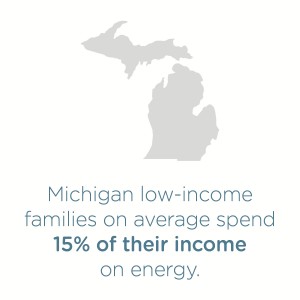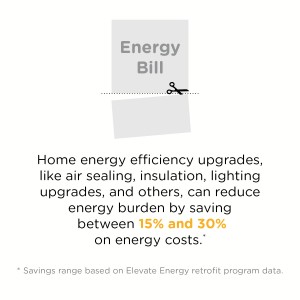Energy Efficiency in Michigan: Creating Financial Stability for Low-Income Families and the Nonprofits that Serve Them
 More than 1.4 million Michigan households, or 37%, are considered low-income, earning less than $30,000 annually. Many low-income households face a large energy burden, which can be defined as a household’s heating and electric expenses as a percentage of income.
More than 1.4 million Michigan households, or 37%, are considered low-income, earning less than $30,000 annually. Many low-income households face a large energy burden, which can be defined as a household’s heating and electric expenses as a percentage of income.
Great progress to reduce energy burden has been made in the Midwest by improving energy efficiency, but hard-to-reach populations still face barriers to access programs and funding. To reach these markets, we need to know more about them. Elevate Energy’s approach is to research underserved markets and present data-driven evidence to underscore the need for energy investments. In this vein, we recently worked on a study of Michigan’s low-income residential and nonprofit sectors to quantify the opportunity for energy use reduction through efficiency improvements. Quantifying these impacts shows that underserved markets can significantly contribute to reducing Michigan’s greenhouse gas emissions, save low-income households money, and strengthen local economies.
Through a generous grant from The Charles Stewart Mott Foundation and the Nonprofit Capacity Building Energy Efficiency Program offered by The Cook Family Foundation, we created four resources to advocate for energy efficiency programs in underserved markets: two white papers entitled “Opportunities for Energy Efficiency in Low Income Michigan Housing” and “Energy Efficiency: A Step Closer to Financial Stability for Michigan Nonprofits,” an energy burden scorecard for the state, and performed energy audits on seven buildings and wrote case studies on projects that completed retrofits.
These four resources serve as tools to help Michigan bring equity into the state’s energy future. They illustrate the energy needs and diversity of the low-income residential and nonprofit sectors; outline a roadmap to a multifaceted approach to energy efficiency program design that meets the needs of Michigan’s unique housing stock and reduces energy burden on low-income families; and demonstrate the effectiveness of retrofits in nonprofit buildings.
For the low-income housing white paper, we compiled a range of data sources to understand the breakdown of low-income households, housing type, and utility usage throughout the state of Michigan. We found that the state’s residential energy consumption ranks higher than the regional and national average. High electric prices point to the potential of high energy burdens on low-income households. To achieve energy and cost savings across the state, Michigan needs a multipronged strategy that delivers utility cost savings that will reduce water, electric, natural gas, and/or propane costs designed to reach each unique community.
One example of such a strategy is the Detroit Local Initiatives Support Corporation (LISC) Multifamily Green Initiative which is supporting developers of affordable housing in Detroit through energy efficiency and solar retrofits. Elevate Energy is working closely with Detroit LISC and their first cohort of affordable housing owners to continue improving housing options for low income families.
The nonprofit white paper highlights that energy efficiency programs are not always designed to be as accessible to nonprofits. This creates an unfortunate reality where nonprofits often miss opportunities to decrease operating costs and use a larger share of their budget on providing much-needed, direct services. The paper makes the case that nonprofits should inquire about and take advantage of existing utility-funded energy efficiency programs, and funders can make clean energy activities more accessible by providing efficiency-specific grant dollars or investments.
 The energy burden scorecard is a handy visual resource to explain the concept of energy burden and the energy burden specifically of low-income Michigan families who spend, on average, 15% of their income on energy.
The energy burden scorecard is a handy visual resource to explain the concept of energy burden and the energy burden specifically of low-income Michigan families who spend, on average, 15% of their income on energy.
Elevate Energy worked with Michigan Energy Options (MEO) to identify and select Shiawassee County nonprofits seeking energy efficiency improvements. MEO and Elevate offered their expertise to expose areas of opportunity for energy and cost savings and assisted nonprofits in becoming financially stable.
We completed energy assessments for Devries Nature Conservancy and the SafeCenter, and provided customized reports highlighting the most cost-effective energy efficiency upgrades. Selected upgrades for Devries Nature Conservancy included an LED lighting retrofit and solar installation financed through a lease agreement with Chart House Energy with no upfront cost to Devries Nature Conservancy. For the SafeCenter, we helped coordinate with Consumers Energy to conduct a lighting fixture replacement, decreasing the organization’s lighting consumption by 78%, allowing additional funding to help domestic violence victims.
We are working toward creating more success stories, like the Spring Manor multifamily facility in Portage, Michigan. In November 2016, after an energy assessment by Elevate Energy, Hollander Development Company replaced 100 inefficient furnaces in an affordable senior housing facility. The energy savings go directly to each tenant while also creating more comfortable and healthy homes.
We’re so excited to continue doing this work in Michigan in the future to help families decrease their energy burden.



